

What Is Collagen, Anyways? Complete Guide To Collagen In Skin Care
It’s no secret that collagen is the key to a youthful-looking complexion. This structural protein provides much-needed support and stability to keep the skin firm, plump and springy. Unfortunately, our bodies’ stores of collagen rapidly decline as we age. Read on to learn what collagen does for the skin and how you can protect it from damage.
Collagen is the building block of many of our tissues and organs, including our bones, muscles, skin and even teeth. This structural protein gets its name from the Greek word “kolla”, meaning glue (a helpful hint for the role it plays in the body). Collagen is what binds our cells and tissues together, helping them retain their shape, elasticity and strength.
Collagen gets its name from the Greek word “kolla”, meaning glue.
The majority of collagen is found and produced in the dermis (the skin’s second layer). Here, fibroblasts synthesize strands of collagen which look like long braids or ropes. According to SELF: “Individual amino acids link up to form long chains, which bundle together to form thicker strands. Those strands then twist and coil around each other to form triple helices. Finally, those helices connect end to end and stack on top of each other to form clusters called fibrils.” These fibrils form a mesh-like network that gives the skin its underlying structure and support.
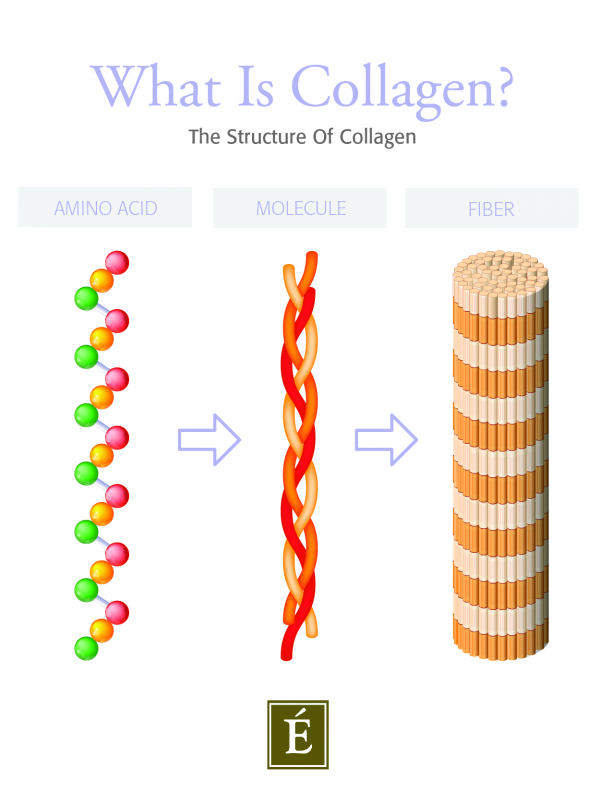
3 Types of Collagen
There are 28 types of collagen found in the body, but Type I, II and III are the most plentiful. These three types constitute up to 90 percent of the body’s total collagen supply. Here’s a breakdown of how they differ:
Type I
Type I is the most common type of collagen and provides structural support for our bones, organs and connective tissues (including the skin). It is incredibly elastic and can stretch considerably without breaking. In fact, an MIT study found that Type I collagen fibrils are five to ten times stronger than steel.
Type II
Type II collagen is the building block of cartilage. Unlike Type I collagen which is neatly arranged, Type II forms more of a jumble. This arrangement gives cartilage its flexible, springy quality which allows it to easily compress and cushion our joints.
Type III
Type III collagen is most concentrated in bone marrow and lymph tissues. Its narrow fibers are arranged in branches that provide support for specialized cells involved in blood cell generation. It is often found alongside Type I collagen in the skin and plays a key role in wound repair.
What Does Collagen Do For Skin
Collagen is the most abundant protein in the skin – and for good reason. This structural protein provides strength, support and elasticity to keep the skin firm, plump and youthful. Here’s a closer look at what collagen does for the skin.
Provides Support & Structure
Collagen fibers bind tissue together. With their strong, braid-like composition, they function much like sturdy columns that hold up and support the top layer of skin. When you’re young, these columns provide the stability and rigidity that keep your skin tight and lifted. This strong foundation keeps your skin’s youthful shape intact.
Also shop at our friends online at:JustShopNyc
Keeps Skin Firm & Plump
Along with elastin and hyaluronic acid, collagen is found in the dermis, the middle layer of skin that gives it volume, density and bounce. Together, these materials form a tight, flexible network that keeps skin firm, plump and supple. When plentiful, collagen keeps the skin from sagging and prevents the folding and creasing that contributes to fine lines and wrinkles.
Improves Elasticity
That spring and bounce you see in youthful skin? Credit that to collagen. In addition to keeping your complexion firm and plump, collagen improves the skin’s flexibility and elasticity. This not only helps prevent the formation of wrinkles, it also reduces the appearance of stretch marks and cellulite.
Why Do We Lose Collagen?
The skin contains an abundance of collagen when we’re young, but over time it starts to decline. Dr. Hooman Khorasani, Chief, Dermatologic and Cosmetic Surgery of Mount Sinai Health System tells us: “Our skin has a fine balance between collagen production and collagen breakdown. It can take up to 6 months for collagen to get synthesized in our body. As we get older, corticosteroids tend to halt the production of new collagen and accelerate the breakdown of new collagen.”
Our skin has a fine balance between collagen production and collagen breakdown.
Exposure to environmental stressors accelerates this process. Unhealthy lifestyle habits (like smoking and high sugar intake) as well as stress, pollution and UV rays cause free radical damage that speeds up collagen depletion. By the time we hit our twenties, we lose roughly one percent of collagen every year.
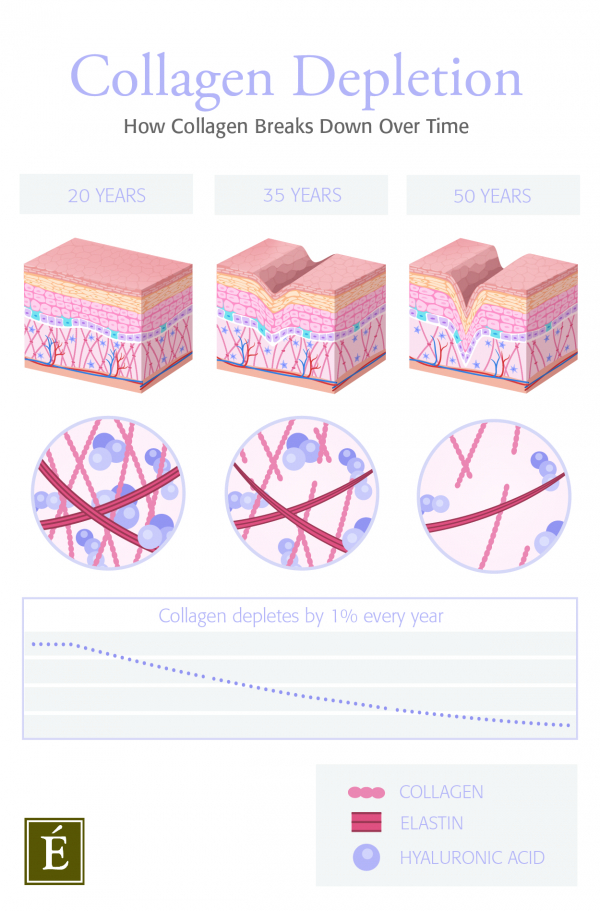
The Result: Visible Signs Of Aging
When we lose more collagen than we produce, the visible signs of aging quickly start to emerge. Weakened collagen cannot provide much-needed structural support and as collagen levels drop, our skin becomes thinner, starts to droop and develops fine lines and wrinkles.
As SHAPE explains, “When collagen is strong, your skin bounces right back. But if collagen is weak, repeated movements cause permanent creases. Skin doesn’t have enough collagen to fill in the groove, so you see a line even when you’re not squinting or furrowing, and it no longer has the same density to resist gravity.”
Ingredients That Stimulate Collagen Production
With collagen’s numerous benefits for the skin, it’s no wonder it’s an ingredient that has begun to pop up in skin care. However, collagen in skin care isn’t quite as simple as tacking it on to an ingredient list. Read on to learn why.
The Problem With Size
The biggest (pun intended) problem with collagen is its size. Dr. Joshua Zeichner tells The Zoe Report: “Pure collagen molecules are too large to actually be absorbed by the body as-is.” Due to their size, these beneficial proteins can’t penetrate the skin. Instead, skin care experts recommend using topical treatments that include ingredients like peptides, retinol and Vitamin C which stimulate and protect your skin’s natural collagen production.
Peptides
To bypass the sizing issue, many topical treatments contain collagen peptides. These smaller chains of amino acids are more easily absorbed by the skin. When they reach the dermis, peptides provide the skin’s fibroblasts with the building blocks they need to produce new collagen. By applying peptides through skin care, we can actually trick the skin into making more of this essential protein.
Retinol
Retinol is another topical ingredient that stimulates collagen synthesis in the skin. According to SHAPE, “Both retinoic acid and retinol ‘turn on’ genes and cells involved in collagen production. They also help organize new and existing collagen.” You can reap the benefits of retinol – and skip its side effects – by opting for a botanical-based version like our Natural Retinol Alternative.
Vitamin C
Antioxidants like Vitamin C pull double duty and stimulate collagen production as well as protect it. Vitamin C not only activates the skin’s fibroblasts to produce new collagen, it also stabilizes the collagen you already have, helping skin stay firm, plump and youthful-looking for longer. Look for serums that pair this antioxidant with Vitamin E and ferulic acid. Research shows that these nutrients amplify Vitamin C’s effectiveness eight-fold!
Vitamin C not only activates the skin’s fibroblasts to produce new collagen, it also stabilizes the collagen you already have, helping skin stay firm, plump and youthful-looking for longer.
Skin Care Products That Help With Collagen Loss
Now that you’re well-versed in the benefits of enhancing and protecting your skin’s collagen, it’s time to explore skin care products that help your skin look strong and youthful. Here are a few of our tried-and-true favorites to enhance and protect your skin.
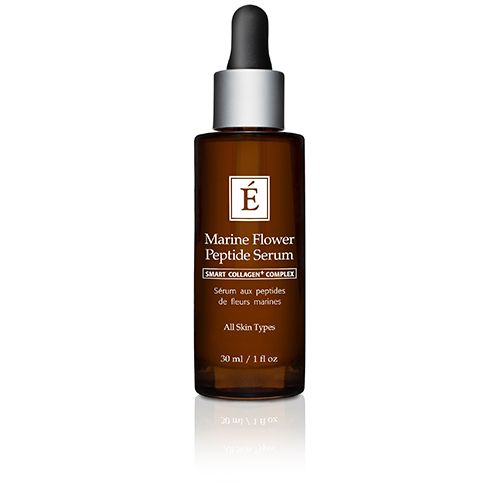
Marine Flower Peptide Serum & Eye Cream
This skin care duo features our Smart Collagen+ Complex which combines botanical collagen, natural plant peptides and algae extracts. Together, these ingredients leave the skin looking strong and elastic. The Marine Flower Peptide Serum and Marine Flower Peptide Eye Cream can be added to any skin care routine to deliver significantly smoother, plumper and more youthful-looking skin.
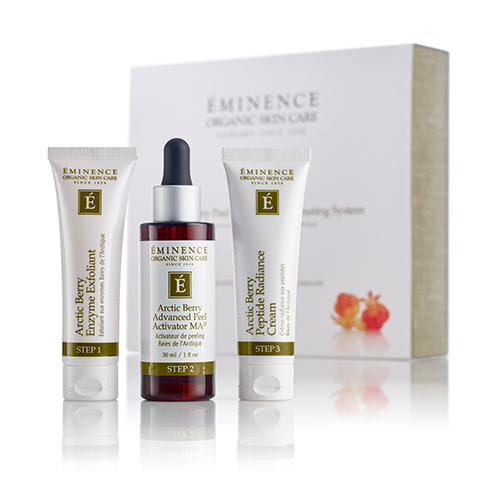
Arctic Berry Peel & Peptide Illuminating System
This three-step peel and peptide system includes a Peptide Illuminating Complex derived from an antioxidant-rich mix of hibiscus seed peptides, gardenia stem cells and yellow plum extract. This blend of antioxidants, botanical peptides and stem cells minimizes the visible signs of aging and gives skin a firmer and smoother appearance.
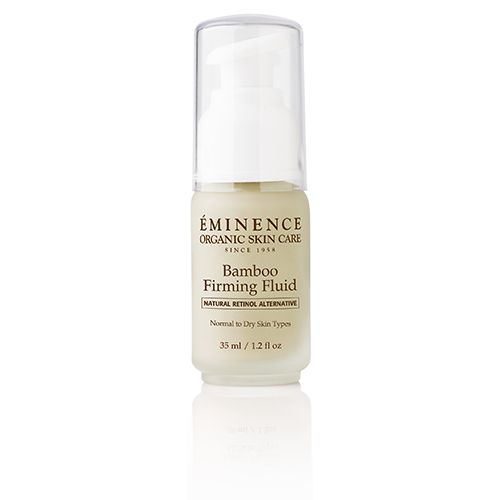
Bamboo Firming Fluid
This silky concentrate is formulated with our Natural Retinol Alternative. This botanical-based complex mimics the effects of conventional retinol by appearing to lift and tighten the skin. Derived from chicory root and tara tree extract, it provides the same firming and smoothing results without the risk of irritation and downtime.
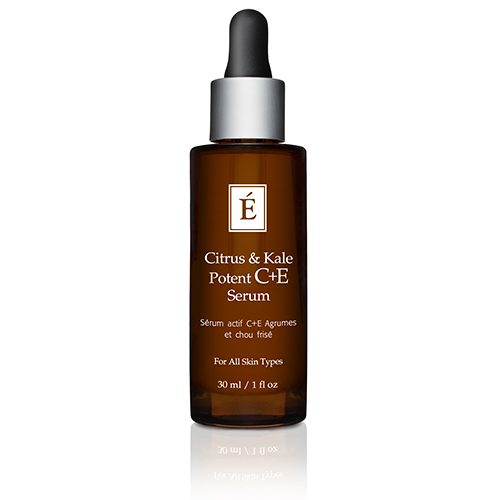
Citrus & Kale Potent C+E Serum
This antioxidant-rich serum combines potent Vitamin C with Vitamin E and ferulic acid. Together, these ingredients help the skin look firm and plump with the visible signs of aging reduced. Eminence Organics Lead Skin Care Trainer Natalie Pergar tells us: “We formulated the Vitamin C concentration to the optimal amount to be non-irritating and still provide powerful antioxidant benefits.”
Spa Treatments
You can also boost your skin’s collagen production with spa treatments. Here are a few of the most popular collagen regenerating treatments available.
Microneedling
Microneedling – or collagen induction therapy – is a tried-and-true methods to stimulate collagen production. This treatment creates thousands of microscopic punctures in the skin to induce wound-healing. These micro-injuries trigger the skin’s fibroblasts to synthesize new collagen and elastin. Stefanie Williams MD tells Get The Gloss: “Medical needling gives skin a gentle nudge to remind it to keep making fresh collagen. It’s a very natural regenerative treatment that helps the skin help itself.”
Medical needling gives skin a gentle nudge to remind it to keep making fresh collagen.
Laser Treatments
Fractionated lasers are another go-to. These work similar to microneedling in that they cause tiny, controlled injuries that trigger the creation of new collagen. In this case, rather than using medical needles, the skin care professional will use resurfacing lasers to stimulate collagen production. Dr. Zeichner tells Harper’s Bazaar: “Lasers work by punching microscopic holes in the skin, creating a controlled burn and taking advantage of the skin’s ability to heal itself after wounds.”
Microcurrent Therapy
If your skin is in the early stages of the aging process, microcurrent treatments can be beneficial. This type of treatment is best for skin that is showing the earliest signs of aging, as it conditions the skin’s fibroblasts to function optimally and continue to produce healthy, high quality collagen. In microcurrent therapy, two metal rods that conduct low-level electricity are drawn over the surface of the skin to stimulate and energize facial muscles.
Are you ready to explore the benefits of collagen skin care? Schedule a consultation with a licensed esthetician at Williamsburg Organic Spa.
Schedule Your Consultation
For more information on the above treatment and our new beauty products for your Face and Body contact us at Tel: 347-799-1221
